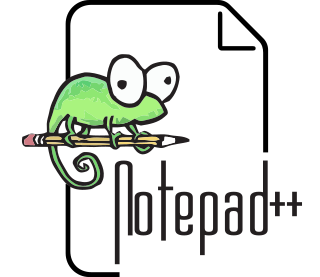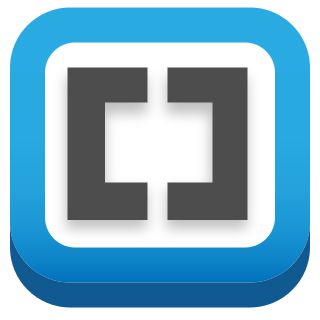SourceForge is a web service that offers software consumers a centralized online location to control and manage open-source software projects and research business software. It provides source code repository hosting, bug tracking, mirroring of downloads for load balancing, a wiki for documentation, developer and user mailing lists, user-support forums, user-written reviews and ratings, a news bulletin, micro-blog for publishing project updates, and other features.
In the written form of many languages, an indentation or indent is an empty space at the beginning of a line to signal the start of a new paragraph. Many computer languages have adopted this technique to designate "paragraphs" or other logical blocks in the program.

Notepad++ is a free and open-source text and source code editor for use with Microsoft Windows. It supports tabbed editing, which allows working with multiple open files in a single window. The product's name comes from the C postfix increment operator; it is sometimes referred to as npp or NPP.
gPHPedit is a discontinued UTF-8-compatible IDE for web development in PHP using the GNOME desktop environment. gPHPedit is built using Scintilla. It was originally written by Andy Jeffries, and was maintained by Anoop John. It is similar to gedit with the difference that it is designed for PHP and HTML text editing. The last version is 0.9.91, released on July 5, 2006. It is free software licensed under the terms of the GNU General Public License (GPL),

Mantis Bug Tracker is a free and open source, web-based bug tracking system. The most common use of MantisBT is to track software defects. However, MantisBT is often configured by users to serve as a more generic issue tracking system and project management tool.

Markdown is a lightweight markup language for creating formatted text using a plain-text editor. John Gruber created Markdown in 2004 as a markup language that is easy to read in its source code form. Markdown is widely used for blogging and instant messaging, and also used elsewhere in online forums, collaborative software, documentation pages, and readme files.
HTML Tidy is a console application for correcting invalid HyperText Markup Language (HTML), detecting potential web accessibility errors, and for improving the layout and indent style of the resulting markup. It is also a cross-platform library for computer applications that provides HTML Tidy's features.

Wireless network cards for computers require control software to make them function. This is a list of the status of some open-source drivers for 802.11 wireless network cards.

Smultron is a text editor for macOS that is designed for both beginners and advanced users, named after the Swedish word for the woodland strawberry.
Phalanger is a compiler front end for compiling PHP source code into CIL byte-code, which can be further processed by the .NET Framework's just-in-time compiler. The project was started at Charles University and is supported by Microsoft. Phalanger was discontinued in favor of the more modern PeachPie compiler, which utilizes the Roslyn API.
Haml is a templating system that is designed to avoid writing inline code in a web document and make the HTML cleaner. Haml gives you the flexibility to have some dynamic content in HTML. Similar to other template systems like eRuby, Haml also embeds some code that gets executed during runtime and generates HTML code in order to provide some dynamic content. In order to run Haml code, files need to have a .haml extension. These files are similar to .erb or .eRuby files, which also help embed Ruby code while developing a web application.

Silex is a free WYSIWYG website builder, that can be used directly in a browser or run offline as a it also provides cross-platform application version. The application includes a drag and drop interface to edit a website, and HTML, CSS and JavaScript editors to add styles and interactivity to the elements.

The Chromium Embedded Framework (CEF) is an open-source software framework for embedding a Chromium web browser within another application. This enables developers to add web browsing functionality to their application, as well as the ability to use HTML, CSS, and JavaScript to create the application's user interface.

Brackets is a source code editor with a primary focus on web development. Created by Adobe Inc., it is free and open-source software licensed under the MIT License, and is currently maintained on GitHub by open-source developers. It is written in JavaScript, HTML and CSS. Brackets is cross-platform, available for macOS, Windows, and most Linux distributions. The main purpose of Brackets is its live HTML, CSS and JavaScript editing functionality.

PHPMailer is a code library to send (transport) emails safely and easily via PHP code from a web server.

Electron is a free and open-source software framework developed and maintained by OpenJS Foundation. The framework is designed to create desktop applications using web technologies that are rendered using a version of the Chromium browser engine and a back end using the Node.js runtime environment. It also uses various APIs to enable functionality such as native integration with Node.js services and an inter-process communication module.








